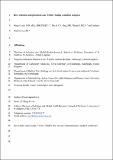How scientists and physicians use Twitter during a medical congress
Abstract
OBJECTIVES: During medical congresses Twitter allows discussions to disseminate beyond the congress hall and reach a wider audience. Insights into the dynamics of social media interactions during congresses, dissemination of scientific information and the determinants of a successful tweet may allow us to better understand social media's role in science communication. METHODS: We retrospectively extracted social media data during the European Congress of Clinical Microbiology and Infectious Diseases (ECCMID) 2017 and 2018 using NodeXL. We compared social media activity during these two congresses. Subsequently, we conducted in-depth analyses to identify the components of a successful tweet and multivariable analysis to assess independent factors associated with retweet activity. RESULTS: In 2018, approximately 13,000 delegates attended ECCMID, but only 591 Twitter accounts actively tweeted about the congress. Although fewer tweets were posted in 2018 compared to 2017 (4,213 vs 4,657, respectively), ECCMID2018 generated a 63% increase in the total number of retweets (p <0.001). According to multivariable logistic regression analysis, using multimedia, URL or hashtags and mentioning other Twitter account(s) were independently associated with retweet success. Mentioning of other users and use of multimedia were the only consistent predictors of retweets irrespective of the number of followers. CONCLUSIONS: A substantial increase in retweet activity and a modest increase in the number of influential Twitter accounts were observed between two successive congresses. Dissemination of scientific messages is more successful when connected accounts are actively involved in social media activity, and social media posts constitute the right combination of components.
Citation
Cevik , M , Ong , D S Y & Mackenzie , G 2019 , ' How scientists and physicians use Twitter during a medical congress ' , Clinical Microbiology and Infection , vol. 25 , no. 12 , pp. 1561.e7-1561.e12 . https://doi.org/10.1016/j.cmi.2019.04.030
Publication
Clinical Microbiology and Infection
Status
Peer reviewed
ISSN
1198-743XType
Journal article
Collections
Items in the St Andrews Research Repository are protected by copyright, with all rights reserved, unless otherwise indicated.

